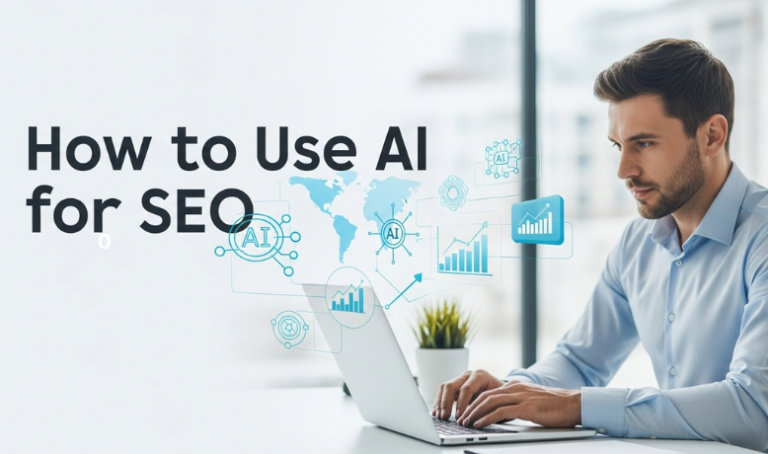In today’s fast-paced digital world, search engine optimization (SEO) has evolved beyond simply adding keywords to a webpage. As Google’s algorithms become smarter and competition grows tougher, businesses need advanced strategies to stay ahead. This is where Artificial Intelligence (AI) steps in.
AI is transforming SEO by automating time-consuming tasks, analyzing massive amounts of data precisely, and uncovering opportunities humans might miss. From keyword research and content optimization to technical audits and predictive analytics, AI-powered tools are helping marketers achieve better rankings, drive more traffic, and improve ROI faster than ever.
Table of Contents
ToggleUnderstanding AI in SEO
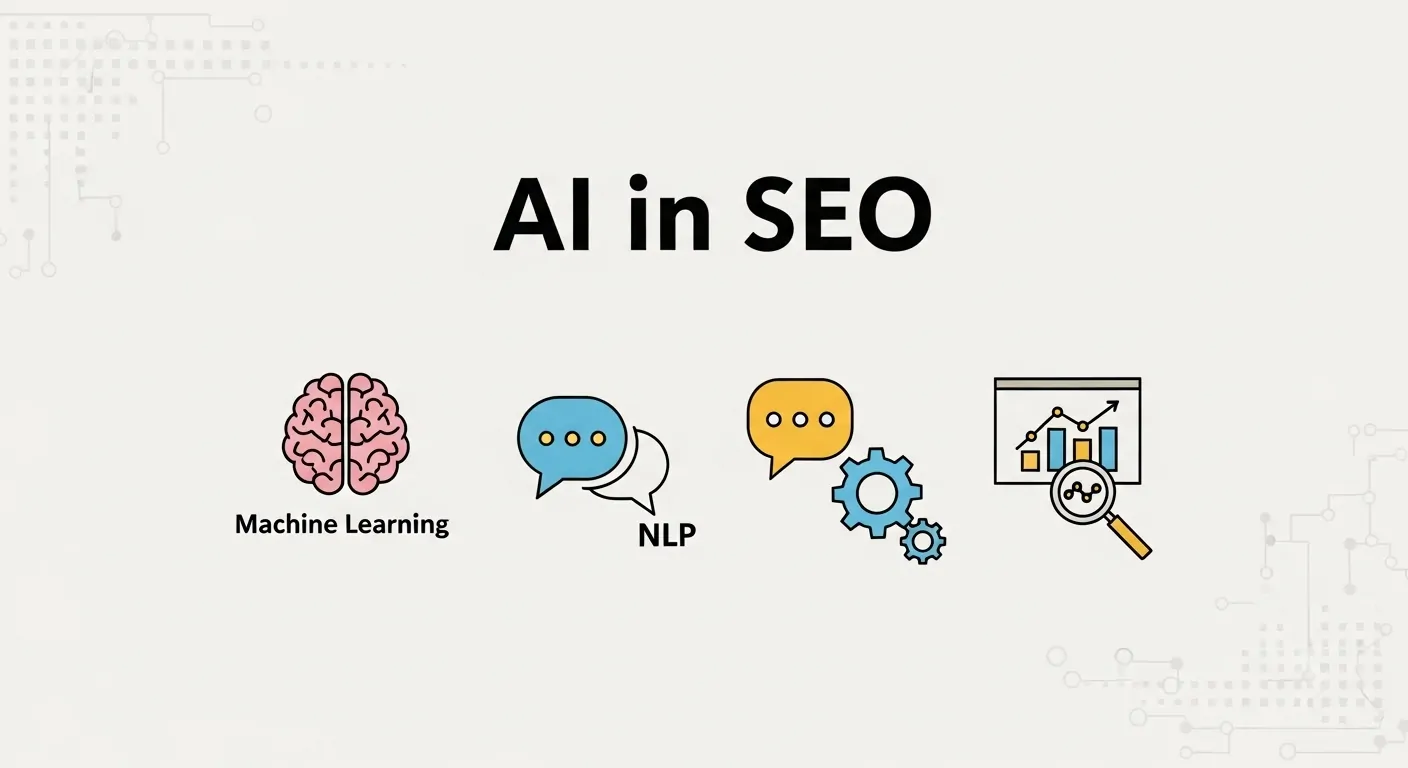
Before diving into tools and tactics, it’s important to understand what AI means in the context of SEO and why it’s reshaping digital marketing.
Artificial Intelligence in SEO uses machine learning, natural language processing (NLP), and automation technologies to analyze data, predict search trends, and optimize websites for better rankings. Unlike traditional SEO methods, which rely heavily on manual effort, AI allows marketers to make data-driven decisions faster and more accurately.
Key Capabilities of AI in SEO:
- Advanced Data Analysis: AI can process large search data sets to uncover hidden opportunities and trends.
- Predictive Insights: Machine learning models can forecast which keywords and strategies are likely to perform best.
- Automation: Tasks like keyword clustering, content optimization, and reporting can be automated, saving hours of manual work.
- Personalization: AI helps deliver tailored search experiences to users, improving engagement and conversions.
AI-Powered Keyword Research

Keyword research is the foundation of any SEO strategy, and AI transforms how marketers discover and prioritize keywords. Finding the right keywords traditionally involved hours of manual searching and analyzing search volumes. With AI, this process becomes faster, smarter, and more accurate.
How AI Helps in Keyword Research
- Automated Keyword Generation: AI tools like ChatGPT, Semrush, Ahrefs, SurferSEO, and Google’s Gemini can instantly suggest hundreds of keyword ideas based on a single topic.
- Search Intent Detection: AI can differentiate between informational, navigational, and transactional keywords, ensuring you target the right audience.
- Keyword Clustering: Advanced AI tools group similar keywords together, making it easier to create topic-based content clusters.
- Competitor Keyword Analysis: AI can analyze top-ranking competitors and suggest keywords you might be missing.
Practical Steps:
1. Use AI Prompts: Ask AI tools to generate long-tail keyword ideas.
Example: “List 20 low-competition, high-search keywords related to AI-driven SEO strategies.”
2. Analyze Keyword Difficulty: Let AI calculate keyword difficulty and ranking potential automatically.
3. Build Keyword Clusters: Use AI tools to organize keywords into themes for content planning.
Content Creation with AI

Creating high-quality, SEO-optimized content is one of the most time-consuming tasks for digital marketers. AI tools have revolutionized this process by automating content generation while maintaining relevance and SEO best practices.
How AI Improves Content Creation
- SEO-Optimized Drafts: AI writing assistants like ChatGPT, WriterZen, Perplexity, Jasper, Writesonic, and SurferSEO can produce blog posts, product descriptions, and landing pages with built-in keyword optimization.
- Headline and Meta Tag Suggestions: AI generates catchy, click-worthy titles and meta descriptions that increase CTR.
- Content Personalization: Machine learning algorithms can tailor content to match the target audience’s interests and search intent.
- Multilingual Content: AI can translate and localize content for international SEO strategies.
Practical Steps:
- Generate Blog Drafts: Provide AI with a topic and desired tone to create a full-length article quickly.
- Optimize for Keywords: Use AI SEO tools to naturally insert primary and secondary keywords.
- Create Meta Tags: Ask AI to generate engaging meta titles and meta descriptions under character limits.
- Humanize the Content: Review and edit AI-generated drafts to add brand voice and unique insights.
Creating Content Briefs and Outlines with AI
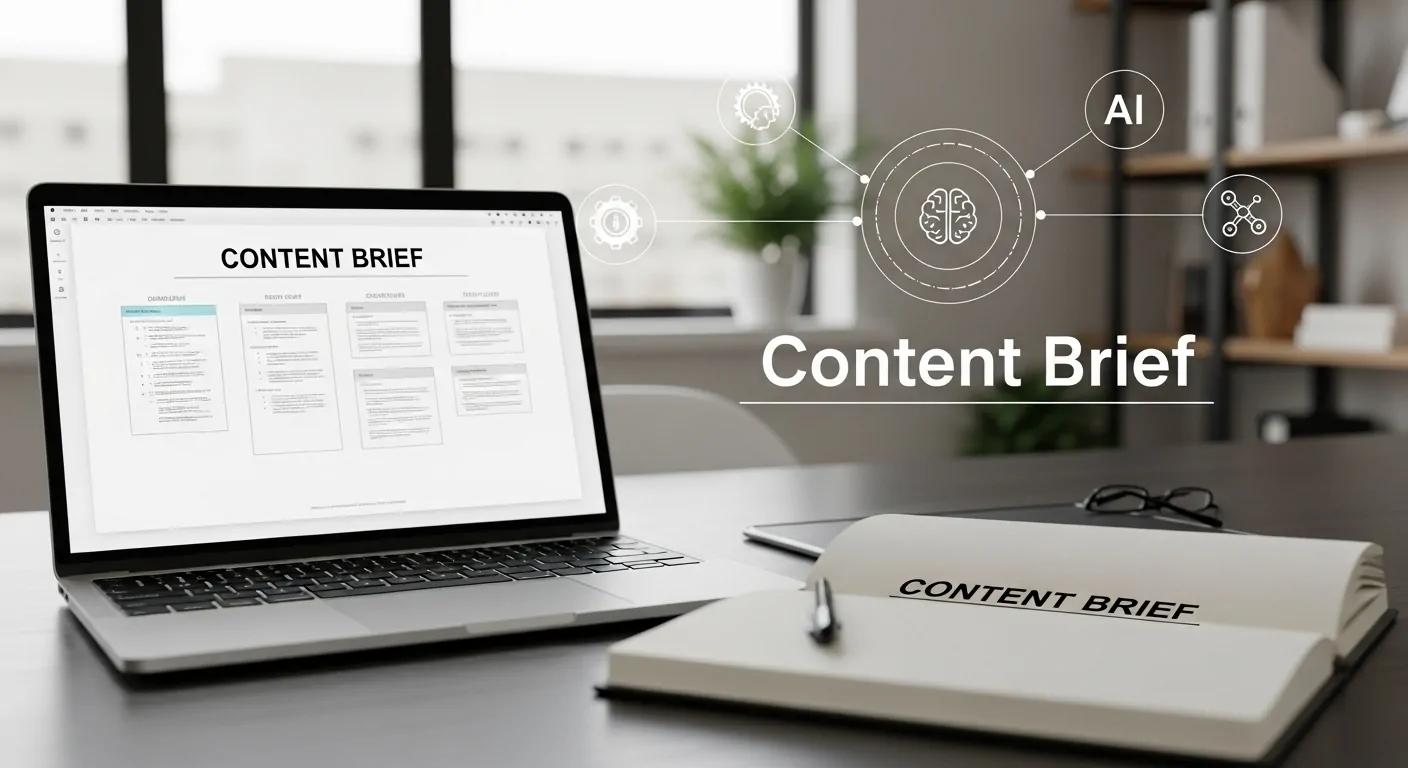
Before writing a full article, SEO experts usually create a content brief—a structured document that guides writers on what to include for the best search performance. AI has made this process faster, data-driven, and more effective.
How AI Helps with Content Briefs
- Topic Research: AI analyzes top-ranking pages and extracts common headings, questions, and keyword usage.
- Outline Generation: Tools like Frase, Clearscope, and ChatGPT can automatically generate detailed outlines with suggested word counts and subtopics.
- Search Intent Mapping: AI identifies whether the content should be informational, commercial, or transactional.
- Internal Linking Suggestions: Some tools provide recommendations for interlinking with existing content on your website.
Practical Steps:
- Input a Topic: Enter your main keyword into an AI content planner.
- Analyze Competitors: Let AI study the top 10 SERP results and highlight content gaps.
- Generate a Structured Outline: AI creates H2S, H3S, FAQs, and suggested word counts for each section.
- Finalize the Brief: Add your unique brand tone and additional instructions before passing it to writers or AI tools for drafting.
Content Optimization and Auditing with AI
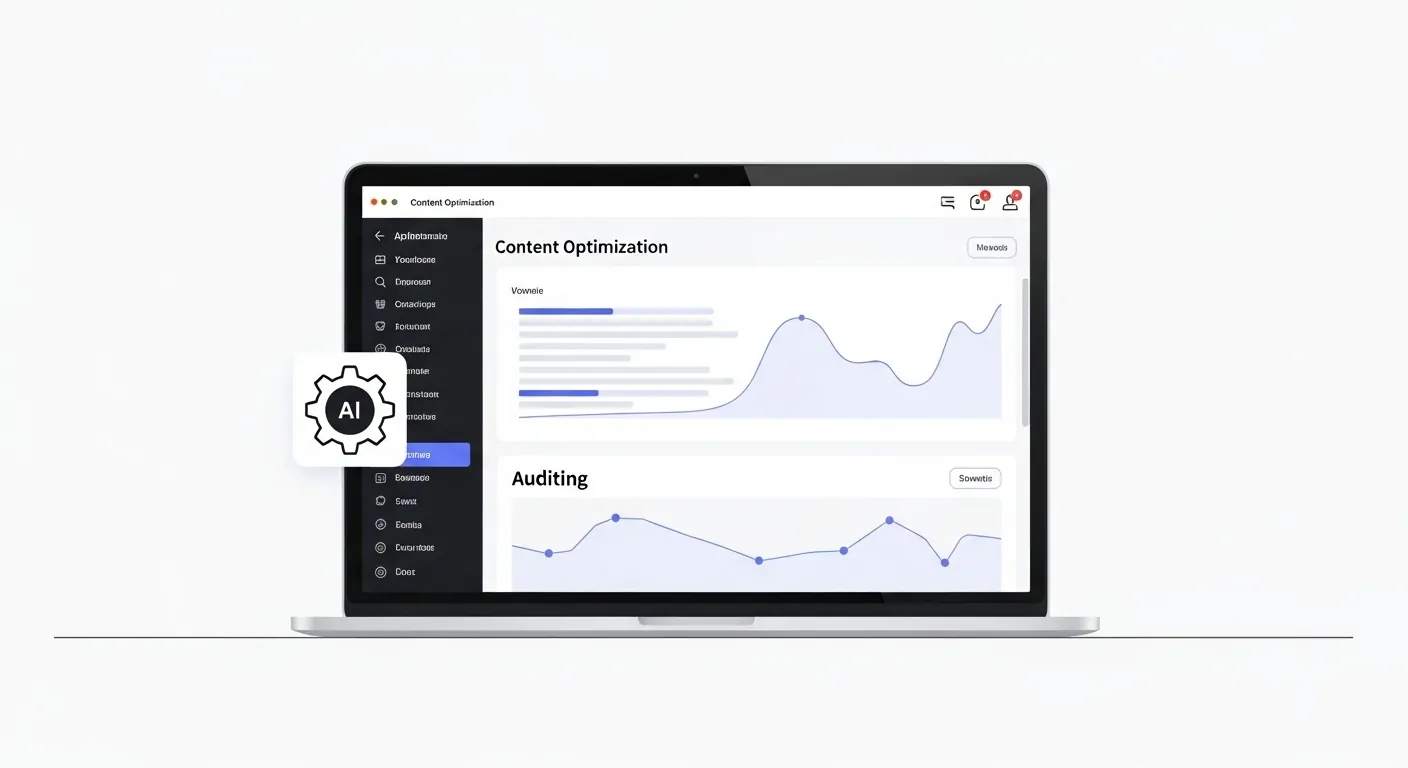
Even great content can struggle to rank if it’s not properly optimized. AI-powered tools help you analyze, improve, and update your content to meet current SEO standards and outperform competitors.
How AI Helps with Optimization
- SEO Scoring: Tools like Surfer SEO, Clearscope provide real-time content scores based on keyword usage and relevance.
- Keyword Gap Analysis: AI identifies missing keywords and phrases for which competitors rank.
- Readability and Structure: AI analyzes sentence complexity and heading hierarchy and suggests improvements to improve user experience.
- Content Refreshing: AI tools can suggest updates for outdated posts to improve freshness and ranking potential.
Practical Steps:
- Run a Content Audit: Use AI to analyze your existing pages for SEO gaps and performance issues.
- Improve Keyword Coverage: Add or adjust keywords that AI highlights as missing or underused.
- Optimize Readability: Follow AI suggestions for sentence length, structure, and content flow.
- Update Meta Data: Refresh titles, meta descriptions, and internal links to align with current SEO trends.
Automating On-Page SEO with AI

On-page SEO involves optimizing individual web pages to improve search visibility and rankings. Traditionally, this required manual effort, but AI has enabled automating many aspects of on-page optimization, saving time and ensuring higher accuracy.
How AI Enhances On-Page SEO
- Meta Tags Generation: AI tools can automatically write optimized titles and meta descriptions tailored for target keywords.
- Schema Markup Creation: AI can generate structured data (FAQ, product, article schema) to improve rich snippet visibility.
- Internal Linking Suggestions: AI identifies link opportunities between pages to strengthen site architecture.
- Content Structuring: Machine learning algorithms analyze top pages and suggest ideal heading structures and keyword placement.
Practical Steps:
- Generate Meta Tags: Use AI tools to create titles and descriptions with high CTR potential.
- Implement Schema Markup: Automatically generate JSON-LD code for rich results and validate with Google tools.
- Optimize Headers and Subheadings: Let AI suggest heading adjustments for better SEO hierarchy.
- Automate Internal Linking: Use AI to identify and insert internal links, improving crawlability and user navigation.
Image and Video SEO with AI

Visual content plays a crucial role in SEO, as images and videos improve engagement and well time and can even rank in visual search results. AI makes optimizing multimedia content for search engines easier without manual effort.
How AI Improves Image SEO
- Automatic Alt-Text Generation: AI can instantly create descriptive alt tags for images, improving accessibility and search visibility.
- Image Compression: AI tools reduce file sizes without losing quality, enhancing page speed and SEO performance.
- Image Recognition for Tags: Machine learning can categorize and tag images for better indexing.
How AI Enhances Video SEO
- Transcript Generation: AI can auto-generate accurate video transcripts and captions, making them indexable.
- Video Summaries: Tools create keyword-rich descriptions and highlights for better search ranking.
- Thumbnail Optimization: AI suggests high-performing thumbnails to boost click-through rates.
Practical Steps:
- Add AI-Generated Alt Text: Automatically generate descriptive tags for all images.
- Use AI for Video Transcripts: Improve indexing and accessibility with captions and transcripts.
- Optimize Multimedia Titles: AI can suggest SEO-friendly titles for videos and images.
- Monitor Visual Performance: Use AI analytics to track image and video engagement in search results.
Competitor Analysis and Backlink Strategy with AI
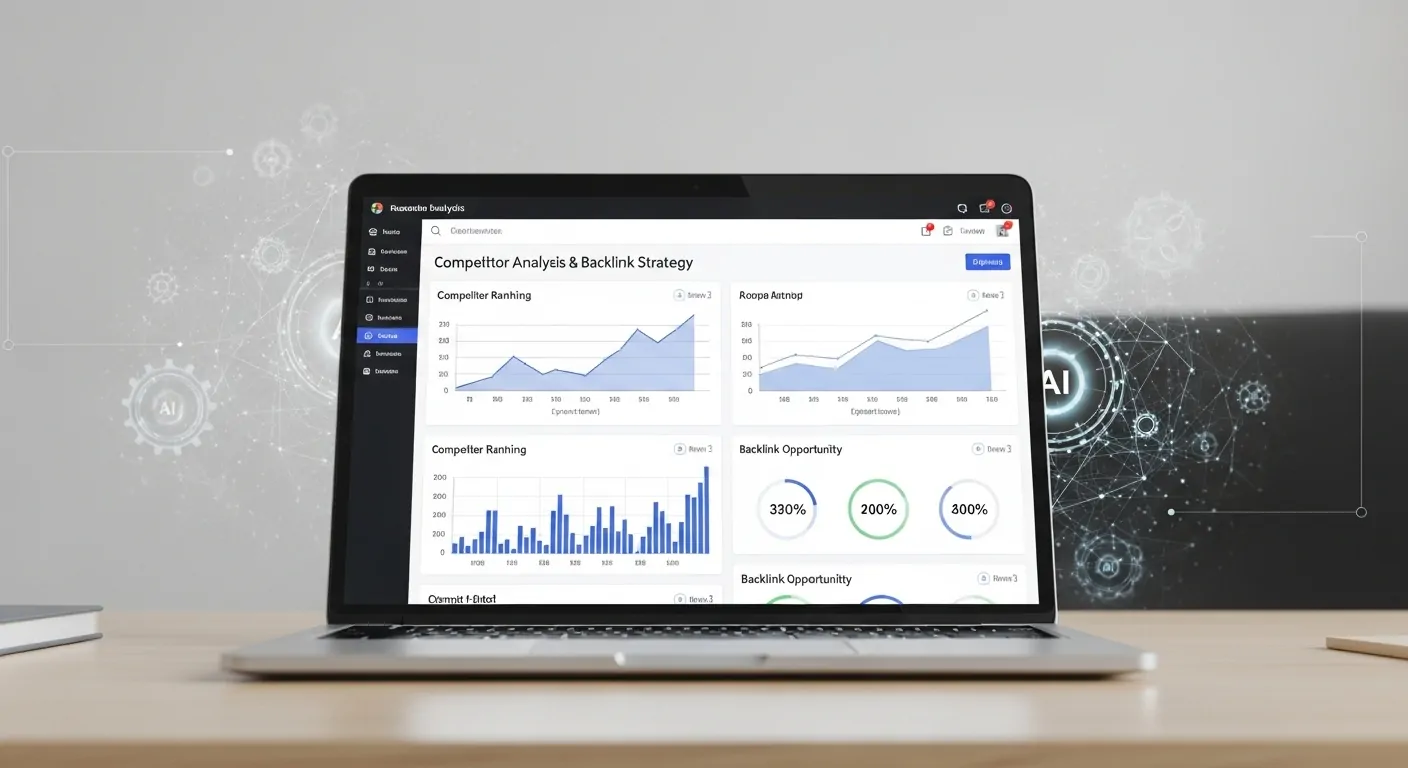
A strong SEO strategy requires understanding your competitors and building high-quality backlinks. AI simplifies these tasks by automating competitor research and identifying link-building opportunities faster than manual methods.
How AI Helps in Competitor Analysis
- Keyword Gap Detection: AI tools analyze competitor rankings and show keywords you’re missing.
- Content Strategy Insights: AI evaluates top-performing competitor content and highlights topics you should target.
- SERP Feature Tracking: AI monitors competitors’ appearance in snippets, local packs, or video results.
How AI Improves Backlink Strategy
- Backlink Discovery: AI scans competitor websites to find backlink sources.
- Outreach Automation: AI-powered platforms personalize outreach emails for guest posting and link acquisition.
- Spam Link Detection: AI identifies toxic backlinks that could harm your rankings.
Practical Steps:
- Run Competitor Analysis: Use AI tools like Semrush, Ahrefs, or Surfer SEO to map out keyword gaps.
- Identify Backlink Sources: Find websites linking to your competitors and target them for outreach.
- Automate Outreach Emails: Use AI to draft personalized pitches for guest posts or collaborations.
- Monitor Link Quality: Continuously track and clean harmful backlinks using AI monitoring tools
AI in Technical SEO
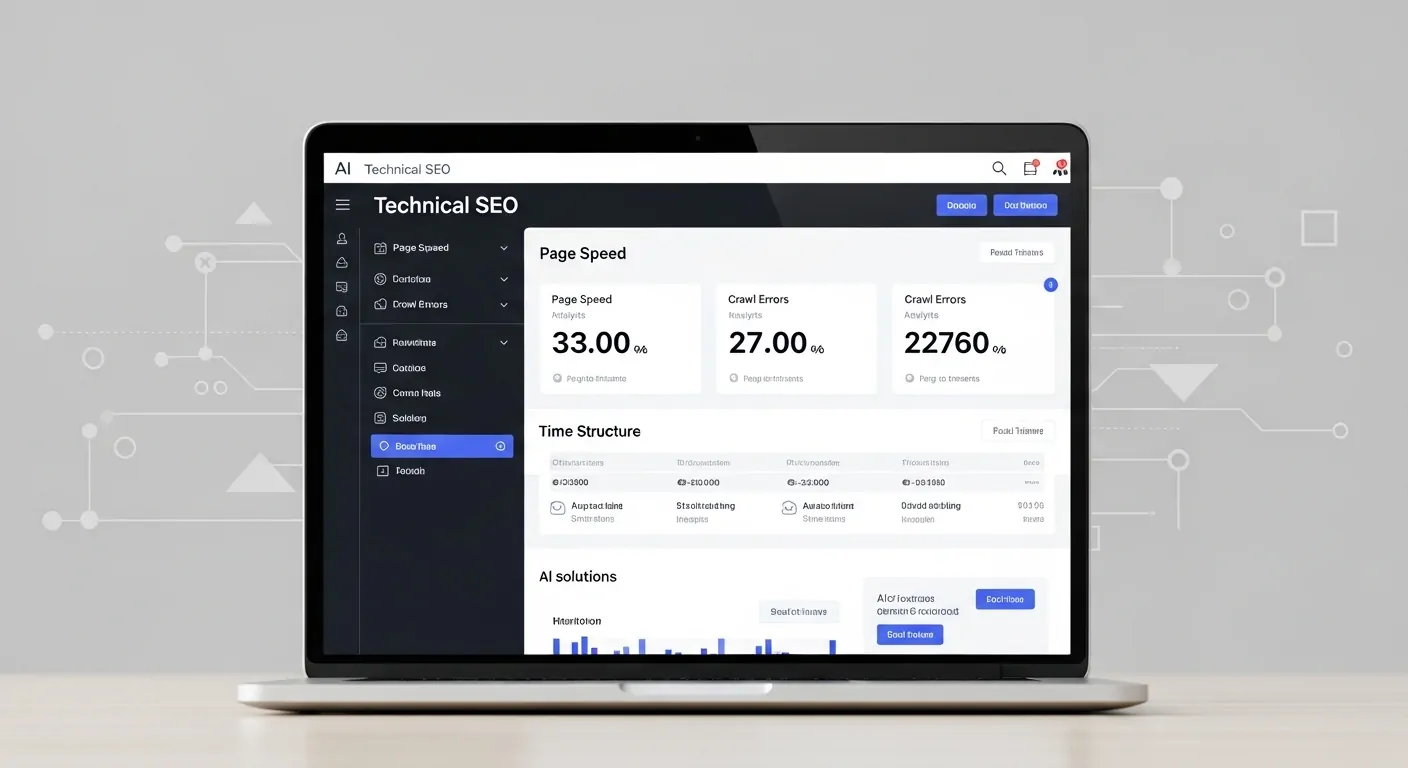
Technical SEO ensures your website is well-structured, fast, and easy for search engines to crawl and index. Identifying and fixing technical issues can be challenging, but AI tools automate the process, providing instant insights and solutions.
How AI Enhances Technical SEO
- Website Crawling and Error Detection: AI tools scan your site for broken links, duplicate content, and crawl errors.
- Page Speed Optimization: AI identifies slow-loading elements and suggests performance improvements.
- Mobile and Core Web Vitals Analysis: AI evaluates site responsiveness, layout shifts, and interaction delays for better rankings.
- Automated Sitemap and Robots.txt Management: AI can generate and update these files to improve crawlability.
Practical Steps:
- Run an AI-Powered Site Audit: Use tools like Screaming Frog, JetOctopus, or Sitebulb to detect technical issues.
- Optimize Site Speed: AI recommends image compression, script optimization, and caching strategies.
- Enhance Mobile Usability: Automatically test and adjust site elements for a better mobile experience.
- Generate Technical SEO Files: Use AI to create or update XML sitemaps and robots.txt for proper indexing.
Tracking and Analytics with AI
![]()
Measuring SEO success is as important as implementing it. AI-powered analytics tools provide real-time, data-driven insights, allowing you to make smarter decisions and continuously improve your strategy.
How AI Improves SEO Tracking
- Automated Performance Reports: AI creates detailed reports showing traffic, keyword rankings, and conversions without manual input.
- Predictive Analytics: Machine learning predicts future trends and keyword performance, helping you plan.
- Behaviour Analysis: AI tracks user behaviour (bounce rate, time on page) and suggests UX improvements.
- Anomaly Detection: AI quickly identifies sudden drops in rankings or traffic to prevent long-term SEO damage.
Practical Steps:
- Set up AI Dashboards: Use tools like Google Analytics, Looker Studio, or SEMrush AI for automated tracking.
- Monitor Keyword Rankings: AI tracks daily position changes and notifies you of opportunities or threats.
- Analyze User Experience: AI interprets heatmaps, session recordings, and engagement data for better optimization.
- Generate Actionable Insights: Let AI summarize reports and suggest next steps to improve SEO ROI.
Best Practices for Using AI in SEO
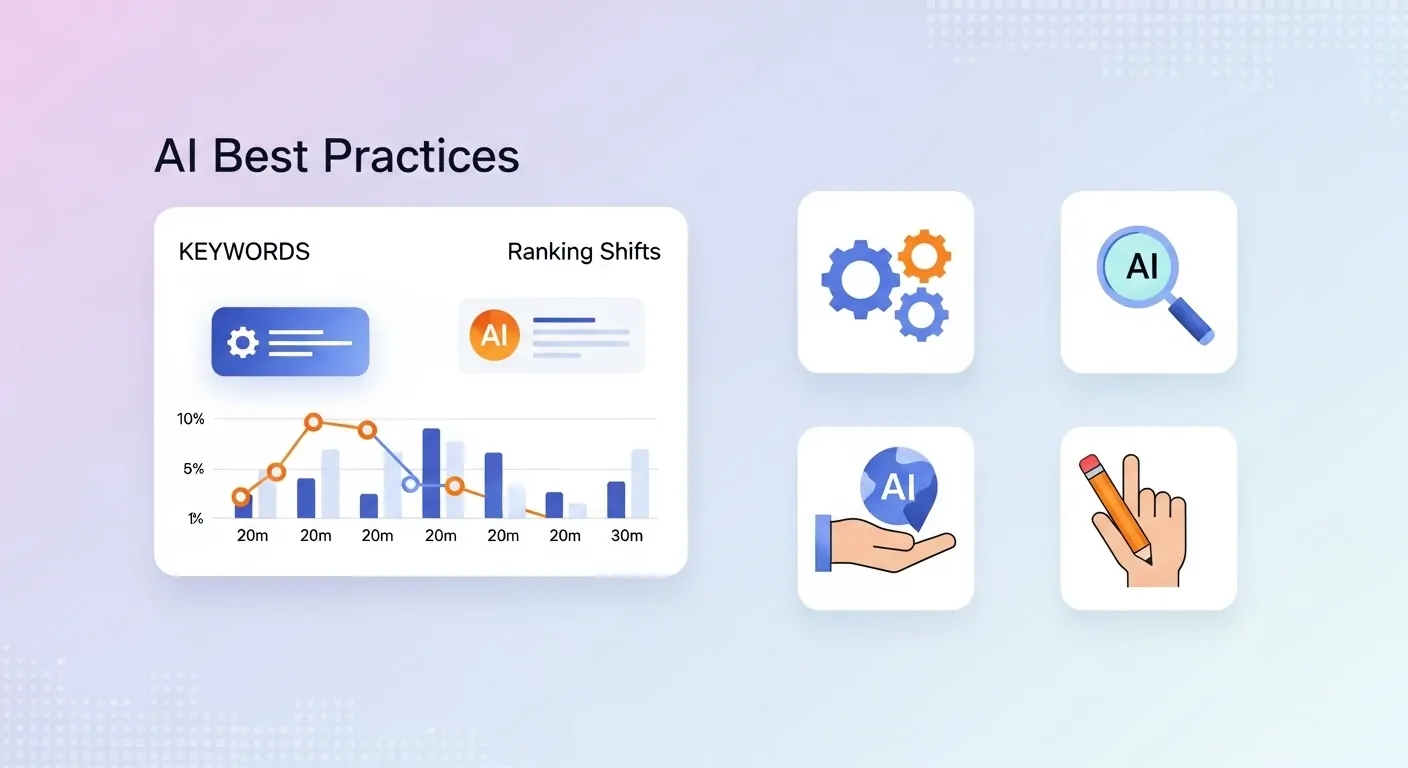
While AI offers powerful tools for SEO, it’s important to use it strategically to avoid common pitfalls and achieve sustainable results. Here are some best practices to keep in mind:
Combine AI with Human Expertise
- AI can generate content and insights, but human creativity, brand voice, and critical thinking are irreplaceable.
- Always review AI-generated content to ensure accuracy and uniqueness.
Focus on Search Intent
- Don’t rely on keyword stuffing—ensure that AI-driven content matches the user’s search intent.
- Use AI to analyze SERP features and understand what Google rewards for each query.
Maintain Content Quality
- Avoid publishing raw AI-generated text. Enhance it with examples, case studies, and personal expertise.
- Use AI tools for optimization, but add a human touch for better engagement.
Monitor Algorithm Changes
- Search engines update their algorithms frequently. Use AI tools to stay ahead of changes and adjust strategies.
- AI-based rank tracking helps detect shifts early.
Prioritize Ethical AI Usage
- Avoid black-hat tactics like automated spammy link building.
- Use AI responsibly to create value-driven, user-friendly content.
Conclusion
Artificial Intelligence transforms SEO by automating tedious tasks, uncovering valuable insights, and enabling smarter optimization strategies. AI empowers marketers to work faster and more effectively, from keyword research and content creation to technical audits, backlink building, and performance tracking. However, true success lies in balancing AI’s capabilities with human creativity and expertise. By strategically integrating AI tools, maintaining high-quality content, and adapting to search engine updates, businesses can gain a significant competitive advantage and achieve sustainable long-term growth in search rankings.

